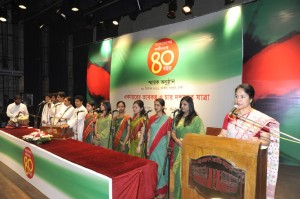 Bangladesh has achievements for which her people should feel proud. Within 40 years of independence, Bangladesh has established a globally competitive garments industry, moved ahead of India in particular areas of human development and gender parity, extended microcredit to 25 million women, and drastically reduced aid dependency through the robust growth in remittances sent by the migrants. But these achievements are also reminders of the fact that much more could have been done as a nation and the promises inspiring the liberation war of the country could have been fulfilled thereby. Professor Rehman Sobhan, one of the visionaries of the Economic Philosophy of the Liberation Movement of Bangladesh and Founding Chairman, CPD said so at a CPD event titled, 40th Anniversary of Bangladesh’s Independence: The Vision and The Journey on 30 December 2011 at the National Museum Auditorium.
Bangladesh has achievements for which her people should feel proud. Within 40 years of independence, Bangladesh has established a globally competitive garments industry, moved ahead of India in particular areas of human development and gender parity, extended microcredit to 25 million women, and drastically reduced aid dependency through the robust growth in remittances sent by the migrants. But these achievements are also reminders of the fact that much more could have been done as a nation and the promises inspiring the liberation war of the country could have been fulfilled thereby. Professor Rehman Sobhan, one of the visionaries of the Economic Philosophy of the Liberation Movement of Bangladesh and Founding Chairman, CPD said so at a CPD event titled, 40th Anniversary of Bangladesh’s Independence: The Vision and The Journey on 30 December 2011 at the National Museum Auditorium.
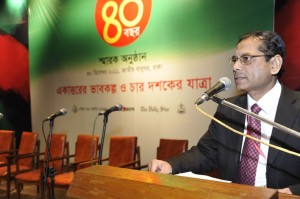 The commemoration event was jointly organised by CPD, Prothom Alo, The Daily Star and Ain o Salish Kendra (ASK). Air Vice Marshal (Retd) A K Khandaker (Bir Uttam), MP, Deputy Chief of Staff of the Bangladesh Armed Forces during the Liberation War and Hon’ble Planning Minister of the Government of Bangladesh attended the programme as Chief Guest, while Noble Laureate Professor Amartya Sen, an eminent supporter of our Liberation War was present as the Special Guest. Mr Matiur Rahman, Editor, Prothom Alo; Mr Mahfuz Anam, Editor and Publisher, The Daily Star and Professor Mustafizur Rahman, Executive Director, CPD also spoke in the programme which was presided over by Advocate Sultana Kamal, Member, CPD Board of Trustees and Executive Director, ASK.
The commemoration event was jointly organised by CPD, Prothom Alo, The Daily Star and Ain o Salish Kendra (ASK). Air Vice Marshal (Retd) A K Khandaker (Bir Uttam), MP, Deputy Chief of Staff of the Bangladesh Armed Forces during the Liberation War and Hon’ble Planning Minister of the Government of Bangladesh attended the programme as Chief Guest, while Noble Laureate Professor Amartya Sen, an eminent supporter of our Liberation War was present as the Special Guest. Mr Matiur Rahman, Editor, Prothom Alo; Mr Mahfuz Anam, Editor and Publisher, The Daily Star and Professor Mustafizur Rahman, Executive Director, CPD also spoke in the programme which was presided over by Advocate Sultana Kamal, Member, CPD Board of Trustees and Executive Director, ASK.
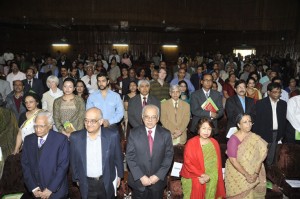 In his keynote paper titled Bangladesh at 40: Looking Back and Moving Forward, Professor Sobhan shed light upon the journey of Bangladesh, what was aspired at the time of independence, her achievements thus far, and the challenges that are still prevailing. By way of explaining where the country has fallen short of, he maintained that contrary to the public aspiration, mass poverty has perpetuated to an unacceptably high level over the past four decades even though the percentage level has decreased. He added that investment is necessary for upgradation of skills and productivity of the farmers, artisans, rural industries and garments workers which would enable them to gain more from their labours and improved productivity.
In his keynote paper titled Bangladesh at 40: Looking Back and Moving Forward, Professor Sobhan shed light upon the journey of Bangladesh, what was aspired at the time of independence, her achievements thus far, and the challenges that are still prevailing. By way of explaining where the country has fallen short of, he maintained that contrary to the public aspiration, mass poverty has perpetuated to an unacceptably high level over the past four decades even though the percentage level has decreased. He added that investment is necessary for upgradation of skills and productivity of the farmers, artisans, rural industries and garments workers which would enable them to gain more from their labours and improved productivity.
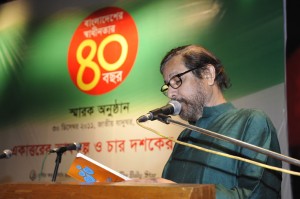 He stressed the need for democratisation of the economic opportunities by providing resources to the deprived for acquiring productive assets like land, water and technology, so that they may compete more equitably in the market place. He also emphasised on providing them access to education and health facilities.
He stressed the need for democratisation of the economic opportunities by providing resources to the deprived for acquiring productive assets like land, water and technology, so that they may compete more equitably in the market place. He also emphasised on providing them access to education and health facilities.
About relationship with the two giant emerging neighbouring countries, India and China, Professor Sobhan said this provides extraordinary opportunities for Bangladesh. Rather than being obsessed about the dominance of these neighbours, the CPD Chairman suggested to have confidence on our own competitiveness, professional capacities and negotiation skills to build relationships of mutual benefit with them.
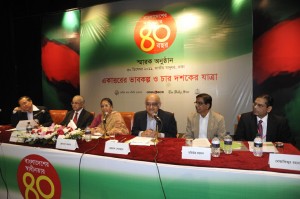 Addressing the malfunctioning of the democratic process, he mentioned that the political oppositions over successive regimes have become marginalised because of its own political immaturity of boycotting parliament. He warned that in the vacuum left by a non-performing parliament the sustainability of the democratic process would continue to be undermined.
Addressing the malfunctioning of the democratic process, he mentioned that the political oppositions over successive regimes have become marginalised because of its own political immaturity of boycotting parliament. He warned that in the vacuum left by a non-performing parliament the sustainability of the democratic process would continue to be undermined.
Nobel Laureate Professor Sen recognised the progress of Bangladesh after her independence and said that the people who once branded Bangladesh as a ‘bottomless basket’ are now considering it as a model of progress.
Bangladesh, being a victim of global climate change should assume the leadership role in the climate battle as a starring role in action against global warming has significantly enhanced the prestige of Bangladesh in the international arena, added Professor Sen.
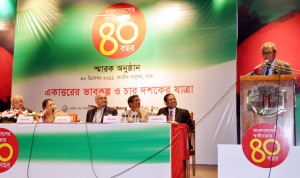 Hon’ble Planning Minister A K Khandker said Bangladesh has made a diversified advancement in the last 40 years. Though there remain many challenges, growth of Bangladesh continued even amid global recession, said the Minister. He, however, admitted that there is still income gap between the rich and the poor.
Hon’ble Planning Minister A K Khandker said Bangladesh has made a diversified advancement in the last 40 years. Though there remain many challenges, growth of Bangladesh continued even amid global recession, said the Minister. He, however, admitted that there is still income gap between the rich and the poor.
With almost 600 people in the audience, the programme began with the national anthem of Bangladesh followed by songs and recitations on liberation. To pay tribute to the martyrs of the liberation war of Bangladesh, one minute silence was also observed.

